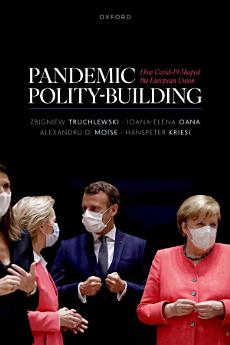Pandemic Polity-Building: How Covid-19 Shaped the European Union
Sep 2025 · Oxford University Press
Ebook
320
Pages
family_home
Eligible
info
reportRatings and reviews aren’t verified Learn More
About this ebook
In 2020, the European Union faced the COVID-19 crisis. This book tells the unlikely story of how the European Union survived a crisis that arrived on the heels of a difficult decade during which the EU wrestled with repeated crises, from the Euro Area, to refugees, populism, and geopolitics. Against all odds, a divided polity with a weak centre and low competences in crucial policy domains, managed to overcome powerful disincentives to coordinate its way out of the pandemic and create central capacity building. Pandemic Polity-Building argues that this puzzling outcome stems from COVID-19's crisis characteristics and the EU's polity features. The relative symmetric nature of the pandemic and the deeply disruptive economic shocks revealed the potential long-term externalities of a lack of joint action at the European level. The EU coordinated a common vaccine procurement scheme and pooled its fiscal firepower. The polity perspective presented here shows how the EU overcame conflicts and managed to coordinate and create new capacity in its centre while relying on a new geography of solidarity within the EU. The polity approach allows the authors in this volume to show how the EU did not take a federal path to polity formation. Instead, it moved towards a polity that serves as an imperfect but solidaristic safety net for its member states. The polity approach thus allows this volume to present a firm analytical grasp over the complex crisis politics unleashed on the EU's compound polity. This is an open access title available under the terms of a CC BY-NC-ND 4.0 International licence. It is free to read at Oxford Scholarship Online and offered as a free PDF download from OUP and selected open access locations.
About the author
Zbigniew Truchlewski is Assistant Professor at the Department of Political Science at the University of Amsterdam, a Research Fellow for the ERC Project “SOLID” at the Robert Schuman Centre for Advanced Studies at the European University Institute, and a Visiting Fellow at the European Institute at the London School of Economics. Ioana-Elena Oana is Assistant Professor at the European University Institute in Florence. Her current work focuses on political behaviour, public opinion formation, and party competition dynamics in European politics. Alexandru D. Moise is a postdoctoral research fellow in the SOLID-ERC project at the European University Institute. His research interests include political behaviour, European politics, and health politics. Hanspeter Kriesi is Professor for Comparative Politics at the European University Institute in Florence. Previously, he held the Stein-Rokkan Chair at this university as well as positions at the universities of Amsterdam, Geneva, and Zurich.
Rate this ebook
Tell us what you think.
Reading information
Smartphones and tablets
Install the Google Play Books app for Android and iPad/iPhone. It syncs automatically with your account and allows you to read online or offline wherever you are.
Laptops and computers
You can listen to audiobooks purchased on Google Play using your computer's web browser.
eReaders and other devices
To read on e-ink devices like Kobo eReaders, you'll need to download a file and transfer it to your device. Follow the detailed Help Center instructions to transfer the files to supported eReaders.






